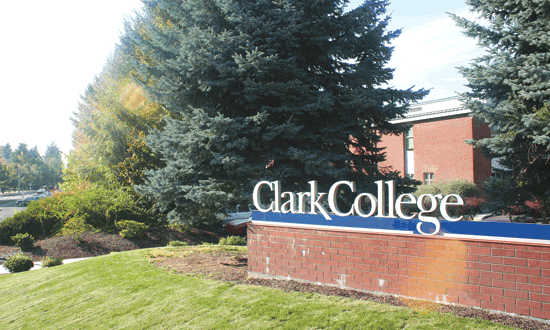In early October, Clark College moved their Corporate and Continuing Education department from the main campus to the West Coast Bank Building in downtown Vancouver.
“We wanted to be more accessible to businesses,” explained Michelle Giovannozzi, corporate relations manager for the department. “Now we’re part of the revitalization of downtown Vancouver.”
This is just one of the many ways Clark College is focusing on the needs of the local business community.
“That has always been our focus,” said Tim Cook, Clark’s VP of instruction, “to meet both the needs of transfer students and the needs of the community’s workforce.”
During the 2011-2012 fiscal year, Giovannozzi said her department served 8,002 students and 34 different companies. A number of departments at Clark College, she added, work with advisory boards to discover the needs of local businesses, creating programs that meet those needs. Here are a few examples of such programs:
Mechatronics – This robotics program, located at Columbia Tech Center, teaches students how to design electronics and mechanized systems. The program graduated its first class of students this past June.
“Our lab is state-of-the-art,” said Cook. “When businesses see it, they are astounded how flexible it is.”
Auto Mechanics – Clark is working closely with Toyota to retool this program into a national model for Toyota mechanics. Students alternate quarters on campus with quarters working at a dealership. Although the program focuses on Toyota, Cook said graduates will be able to work at any dealership.
Dental Hygiene – Clark College recently received a $1.5 million gift from the Firstenburg Foundation to expand this program from 24 students to 30, starting in 2013. Cook said that the expansion will help to meet high local demand for dental hygienists.
Nursing – Located at WSU Vancouver, this program features a state-of-the-art nursing lab. Cook said that Clark has the largest nursing program in the Northwest, with a capacity of 240 students. Graduates from the program can seamlessly transfer to WSU’s bachelor of nursing program. He also said that Clark’s nursing students have the highest rate of passing on their national certification exam than any nursing program in the country.
Cloud Computing – Professor Dwight Hughes, department head of Clark’s Network Technology (DNET) program, said that Clark recently received $250,000 in state funding for new server hardware, which will serve as the foundation for a new 1-year Data Center Technician program.
“We had a lot of industry partners through our advisory committee recommending for three years that this is where we needed to go,” said Hughes.
He said that companies are already advertising out of area for data center technicians, and that many data centers are located nearby – citing 14 Internet service provider data centers in the area, plus many private “clouds,” such as Clark PUD and Portland General Electric (PGE) data centers.
Matt Yung, voice specialist at PGE, attended the DNET program at Clark College several years ago.
“My experience with Clark College has been very positive, especially my time spent with the DNET program,” said Yung. “For students who have yet to learn of virtualization, the new program will expose them to mind blowing capabilities.”
Looking to the Future
Cook said that Clark College participates in the Southwest Washington Workforce Development Council, and that members of the Corporate Education department serve on a variety of boards throughout the county. This, he said, helps the college track and meet new workforce skill demands.
For example, the college recently received a $500,000 grant, as part of a partnership with Bellevue Community College, to incorporate Health Informatics – digital management of health care records and information – into several of Clark’s health care-related programs.
“People in health care have been asking for this,” said Cook.
Giovannozzi said that the college has also recently added training in the new health care coding system called ICD-10, and is engineering training for a new Patient Health Advocate position, based on input from the medical community. Health advocates are multi-skilled care managers who help patients navigate the complex maze of health and social service providers to find appropriate care, among other duties.
Cook said that the gap between community college and university offerings is shrinking. For example, Clark is investigating offering applied baccalaureate degrees related to existing programs.
Wanted: More business participation
All of these programs require not just an effort on Clark College’s part, but also support from the business community. For example, Hughes said that the number of sections he could offer in the new Data Center Technician program was limited by the number of teachers he could find. He said a recent survey indicated that demand would support up to 100 students per year, but he currently has enough teachers for only 36 students.
Yung said that he knew of a Vancouver company that allowed an employee to give back to the community by instructing a course at Clark College during regular business hours.
“Students have the opportunity to learn via an IT professional currently fulfilling a role in the industry, which provides a unique perspective on real-world IT scenarios and the culture within IT departments,” said Yung.
Such participation in the local education effort, Yung said, also benefits businesses, who can use the opportunity to recruit and screen potential new employees.



